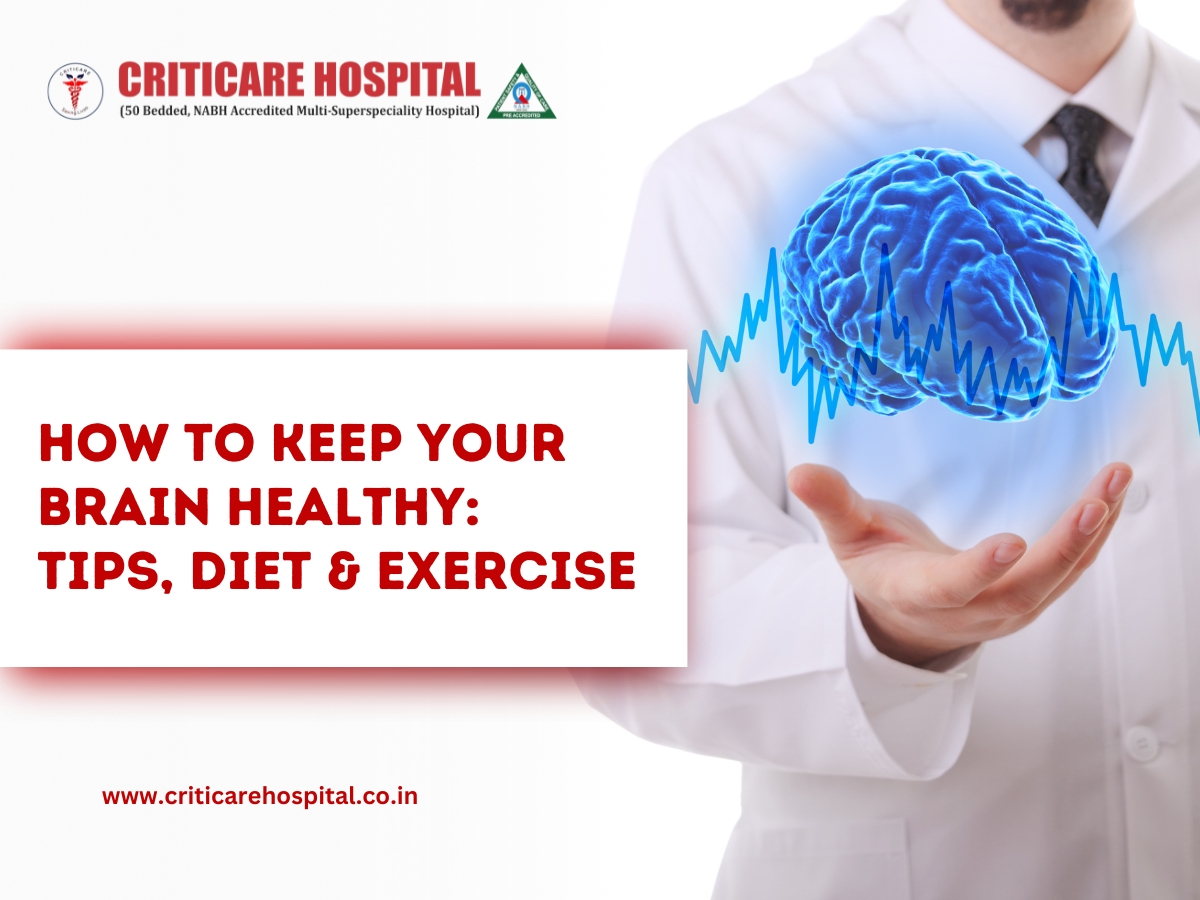Everyone is aware that everything in the body starting from the basic functions to complex ones, is controlled by the main organ of our body which is the brain. Knowing that the brain has this important function, are we taking any measures in keeping brain healthy? As every action and decision is completely in our brain, we are here to provide tips to keep your brain healthy along with diet and exercise that will help in maintaining brain health. Continue reading ahead and make your life healthy with your brain healthy.
Why Is Brain Health A Matter Of Concern:
Everything you do and everything you think is governed by your brain. With age comes an increased risk for cognitive decline, memory loss and Alzheimer’s disease. But there are ways for you to remain mentally sharp and prevent these risks. From childhood through old age, the brain makes it essential to be healthy.
1. Tips for Maintaining Brain Health
Below are some tips that are required to be followed by people who want to maintain brain health and live their lives happily maintaining proper health.
- a) Prioritize Quality Sleep
Repair of the brain also depends on whether it can get enough sleep. Sleep loss can affect how we think and how we make decisions and might also affect our mood.
- Get as much quality sleep as possible every night for 7 – 9 hours.
- On weekends, try to keep the same sleep schedule.
- Set up a relaxing bedtime routine, and with phones and screens, a ban before bedtime.
- b) Manage Stress Effectively
It’s true that too much stress can wreak havoc on your brain health and cortisol is to blame.
- You practice every day mindfulness or meditation is intrinsic.
- Hobbies that you enjoy, that are relaxing.
- Make friends and family a support system.
- c) Keep Your Brain Active
As with any other function, mental stimulation is important to maintaining cognitive function.
- Fight in a war game, solve puzzles, play chess or play brain training games.
- Make learning a new skill, a new language to use your mind.
- Books, read them, write, paint, and explore
- d) Stay Socially Connected
Emotional and mental well-being require human interaction.
- Qualify life with loved ones.
- There is no better way to meet people than by volunteering as a club member or as a part of a group.
- You can volunteer, or better, engage and spend time doing community activities to expand your social network.
- e) Avoid Harmful Habits
To protect your brain avoid behaviours which can cause damage.
- Do not drink too much alcohol or smoke.
- Do things that involve head injuries and wear protective gear, like helmets.
- They manage conditions like high blood pressure, diabetes, and obesity.
2. Brain-Boosting Diet
What you eat is what your brain runs on. Memory, attention and overall health of the brain will be improved if you have a good nutrient-rich diet. Here are key dietary tips:
- a) Including Brain Healthy Foods:
- Fatty Fish: Omega 3 fatty acids are found rich and essential in building brain cells and improving memory. Salmon, mackerel and sardines are but a few examples.
- Berries: Even blueberries, strawberries and blackberries are high in antioxidants that protect the brain from the body’s stress.
- Leafy Greens: Including spinach, kale and broccoli in your diet provides nutrients that help preserve your brain: vitamin K, lutein and folate.
- Nuts and Seeds: Almonds, walnuts, chia seeds and flaxseeds all contain healthy fats and vitamin E, which help keep brain cells safe from damage.
- Whole Grains: Some, like quinoa, brown rice, and such asats, aid in blood flow to the brain and cognitive function.
- Dark Chocolate: Caffeine and antioxidants that improve your brain function and mood; flavonoids.
- b) Stay Hydrated
Dehydrated can make you tired as well as reduce your mental performance. You should be drinking at least 8–10 glasses of water a day. Good, too, are herbal teas and natural fruit-infused water.
- c) Limit Unhealthy Foods
The thing we don’t do is eat sugar, sugar can be bad for our memory, bad for inflammation.
- If brain fog and less focus are because of trans fats and processed foods, cut them out.
- Live gluten-free and/or dairy-free.
- Reduce your exposure to GMO corn.
- d) Follow the Mediterranean Diet.
A fresh fruits, vegetables, and whole grains diet based around fish and olive oil foods. We know it exponentially increases cognitive function and decreases the chances of developing Alzheimer’s.
3. Exercises for Brain Health
Becoming more physically active isn’t just good for your body; it’s good for your brain, too. Exercise enhances neuroplasticity — the brain’s ability to change and grow — improves blood flow, and reduces stress.
- a) Aerobic Exercise
Running, swimming, cycling or brisk walking increases heart rate and helps improve blood flow to the brain.
Try for at least 150 minutes of moderate aerobic activity a week.
- b) Strength Training
Weightlifting, for example, increases memory and executive function.
Do strength training 2–3x per week.
- c) Balance and Coordination
But practices of yoga, tai chi and Pilates not only improve balance but also reduce stress and increase mindfulness.
Especially old adults can use these exercises to prevent and recover from falls as well as to improve cognitive health.
- d) Mindful Movement
Physical activities such as dancing combine physical activity with mental engagement and promote brain health.
Doing so will help you learn new dance routines, and perhaps sign up for a dance class, for extra social interaction.
4. Brain Training and Cognitive Exercises
Engage your brain with activities that stimulate new connections and pathways:
- Memory Games: We can play card-matching games or recall exercises.
- Logic Puzzles: It is sudoku, crosswords, or strategy-based game, for example, chess.
- Learning Challenges: Learn to take online courses and learn a new instrument.
- Technology-Free Activities: Going for a journaling draw, or nature walk to relax and recharge.
5. Lifestyle Changes for Long-Term Brain Health
- a) Maintain a Healthy Weight: Being obese is known to raise the risk of dementia and cognitive decline. Exercise and a balanced diet regularly will help maintain an ideal weight.
- b) Protect Your Head: Wear seat belts and helmets, and do so by practising safe habits to avoid head injuries.
- c) Get Regular Checkups: High cholesterol, diabetes and hypertension can all affect the health of the brain, so monitor them.
- d) Practice Gratitude and living a Positive life: Practices surrounding a positive mindset and gratitude lead to lowered stress and an overall improved brain function.
6. Signs You Need to Prioritize Brain Health
Watch for these early signs of declining brain health:
- Forgetfulness or difficulty focusing frequently.
- Not finishing given tasks or problems.
- Stress, anxiety or depression.
- Poorly quality sleep, and chronic fatigue.
If you see these signs, take note and begin making some changes in how you live or seek the help of a healthcare professional.
Conclusion
Your brain is your most valuable asset, which means it must be a top priority for your health. You can maintain and improve your brain health for many years to come — by making it a habit to sleep well, manage your stress, eat foods that keep your brain healthy, engage in regular exercise, and solve some cognitive challenges. Just remember, little small, consistent efforts today can readily bring big results tomorrow. That’s why it’s time to love and care for your brain now!




